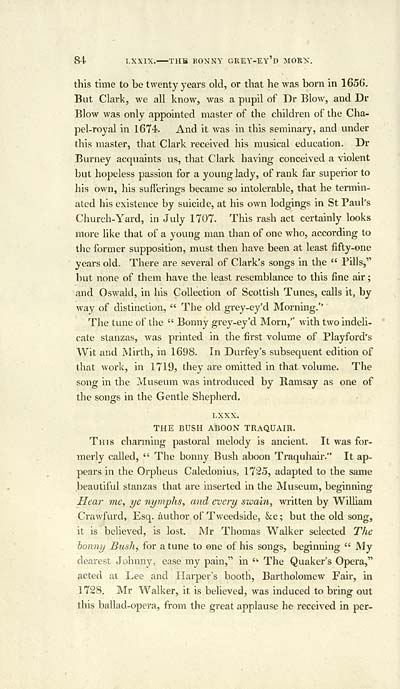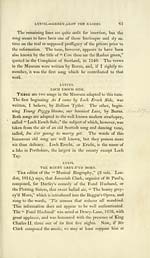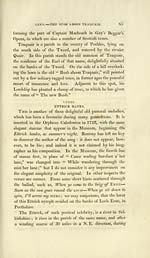Glen Collection of printed music > Printed text > Illustrations of the lyric poetry and music of Scotland
(224) Page 84 - Bush aboon Traquair
Download files
Complete book:
Individual page:
Thumbnail gallery: Grid view | List view

84 LXXIX. THB BONNY GREY-EY'd MORX.
this time to be twenty years old, or that he was born in 1656.
But Clark, we all know, was a pupil of Dr Blow, and Dr
Blow was only appointed master of the children of the Cha-
pel-royal in 1674. And it was in this seminary, and under
this master, that Clark received his musical education. Dr
Burney acquaints us, that Clai'k having conceived a violent
but hopeless passion for a young lady, of rank far superior to
his own, his sufferings became so intolerable, that he termin-
ated his existence by suicide, at his own lodgings in St Paul's
Church-Yard, in July 1707. This rash act certainly looks
more like that of a young man than of one who, according to
the former supposition, must then have been at least fifty-one
years old. There are several of Clark's songs in the " Pills,"
but none of them have the least resemblance to this fine air ;
and Oswald, in his Collection of Scottish Tunes, calls it, by
way of distinction, " The old grey-ey'd Morning."
The tune of the " Bonny grey-ey'd Morn,'' with two indeli-
cate stanzas, was printed in the first volume of Playford's
Wit and Mirth, in 1698. In Durfey's subsequent edition of
that work, in 1719, they are omitted in that volume. The
song in the Museum was introduced by Ramsay as one of
the songs in the Gentle Shepherd.
LXXX.
THE BUSH ABOON TRAQUAIR.
This charming pastoral melody is ancient. It was for-
merly called, '' The bonny Bush aboon Traquhair." It ap-
pears in the Orpheus Caledonius, 1725, adapted to the same
beautiful stanzas that are inserted in the Museum, beginning
Hear me, ye nymphs, and every swain^ written by William
Crawfurd, Esq. author of Tweedside, &c ; but the old song,
it is believed, is lost. Mr Thomas Walker selected The
bonny Btish, for a tune to one of his songs, beginning " My
dearest Johnny, ease my pain," in " The Quaker's Opera,"
acted at Lee and Harper's booth, Bartholomew Fair, in
1728. Mr Walker, it is believed, was induced to bring out
this ballad-opera, from the great applause he received in per-
this time to be twenty years old, or that he was born in 1656.
But Clark, we all know, was a pupil of Dr Blow, and Dr
Blow was only appointed master of the children of the Cha-
pel-royal in 1674. And it was in this seminary, and under
this master, that Clark received his musical education. Dr
Burney acquaints us, that Clai'k having conceived a violent
but hopeless passion for a young lady, of rank far superior to
his own, his sufferings became so intolerable, that he termin-
ated his existence by suicide, at his own lodgings in St Paul's
Church-Yard, in July 1707. This rash act certainly looks
more like that of a young man than of one who, according to
the former supposition, must then have been at least fifty-one
years old. There are several of Clark's songs in the " Pills,"
but none of them have the least resemblance to this fine air ;
and Oswald, in his Collection of Scottish Tunes, calls it, by
way of distinction, " The old grey-ey'd Morning."
The tune of the " Bonny grey-ey'd Morn,'' with two indeli-
cate stanzas, was printed in the first volume of Playford's
Wit and Mirth, in 1698. In Durfey's subsequent edition of
that work, in 1719, they are omitted in that volume. The
song in the Museum was introduced by Ramsay as one of
the songs in the Gentle Shepherd.
LXXX.
THE BUSH ABOON TRAQUAIR.
This charming pastoral melody is ancient. It was for-
merly called, '' The bonny Bush aboon Traquhair." It ap-
pears in the Orpheus Caledonius, 1725, adapted to the same
beautiful stanzas that are inserted in the Museum, beginning
Hear me, ye nymphs, and every swain^ written by William
Crawfurd, Esq. author of Tweedside, &c ; but the old song,
it is believed, is lost. Mr Thomas Walker selected The
bonny Btish, for a tune to one of his songs, beginning " My
dearest Johnny, ease my pain," in " The Quaker's Opera,"
acted at Lee and Harper's booth, Bartholomew Fair, in
1728. Mr Walker, it is believed, was induced to bring out
this ballad-opera, from the great applause he received in per-
Set display mode to: Large image | Transcription
Images and transcriptions on this page, including medium image downloads, may be used under the Creative Commons Attribution 4.0 International Licence unless otherwise stated. ![]()
| Special collections of printed music > Glen Collection of printed music > Printed text > Illustrations of the lyric poetry and music of Scotland > (224) Page 84 - Bush aboon Traquair |
|---|
| Permanent URL | https://digital.nls.uk/91319857 |
|---|
| Description | Scottish songs and music of the 18th and early 19th centuries, including music for the Highland bagpipe. These are selected items from the collection of John Glen (1833 to 1904). Also includes a few manuscripts, some treatises, and other books on the subject. |
|---|
| Description | The Glen Collection and the Inglis Collection represent mainly 18th and 19th century Scottish music, including Scottish songs. The collections of Berlioz and Verdi collected by bibliographer Cecil Hopkinson contain contemporary and later editions of the works of the two composers Berlioz and Verdi. |
|---|

